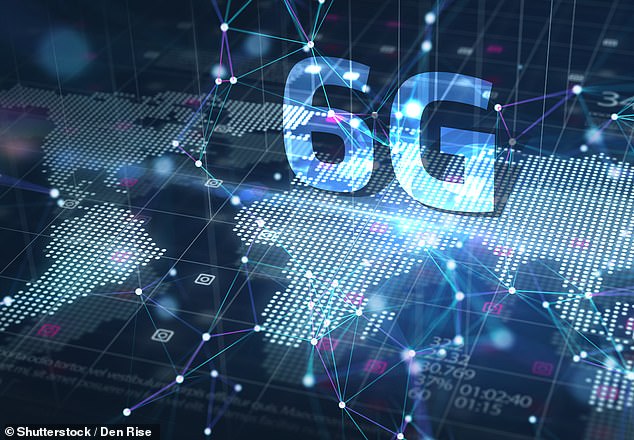Despite many places in the UK still lacking 5G internet, researchers have decided it is time to start looking forward to the next iteration of wireless communication.
The University of Surrey has today announced the launch of an innovation centre dedicated to making 6G mobile internet a reality.
It is the second such centre to be established in the world, after one in Finland.
6G internet will expand on the ultra-fast speeds of 5G and allow for the ‘teleportation of senses’ instantly, researchers claim.
Potential applications include doctors monitoring patients remotely, embracing and holding hands with a loved one who may be thousands of miles away, and having virtual meetings with no lag.
Creating the new wave of wireless internet will require innovation and development, and experts don;t expect it to arrive until around 2030.
Scroll down for video
6G internet will build on the ultra-fast speeds of 5G and allow for the ‘teleportation of senses’ instantly. Potential applications include doctors monitoring patients remotely and embracing and holding hands with a loved one who may be thousands of miles away
Scientists behind the hub say it will be focused on advanced telecommunications engineering that brings together the physical world with advanced virtual ones.
‘5G enables virtual reality or augmented reality, which is a 3D video, so what we are doing in 6G, we are making it four-dimensional, and the fourth dimension is the human senses and all the ambient information around a person,’ Regius Professor Rahim Tafazolli, director of the 6th Generation Innovation Centre, told PA.
‘This is beyond 5G capabilities in the sense that it was designed for broadband, for low latency, for a lot of devices to be connected.
‘If you want to teleport yourself to a virtual reality with your senses, to a virtual world and two people in a virtual world… suppose you are in London and I am in Guildford and we teleport to a virtual world, and in the virtual world we need to interact with each other, like shaking hands – that means we need high-quality time synchronisation, and that aspect of high-quality time synchronisation was never built as part of 5G technology.’
‘With 2G, we could send ringtones, 3G we had pictures, 4G we had video, and in 5G we have virtual reality and augmented reality, which is 3D video,’ he told The Times.
‘6G should be four-dimensional, with sensors that transmit people’s touch, sense of smell and taste, and all the ambient information around a person.’
This could have dramatic implications for healthcare, allowing doctors to tend to patients despite not being with them.
It will also allow for genuine virtual meetings, much like the scene in the 2014 film Kingsman: The Secret Service, where members sit around a table using technology.

6G should be four-dimensional, with sensors that transmit people’s touch, sense of smell and taste, and all the ambient information around a person. It will allow for virtual meetings, much like the scene in the 2014 film Kingsman: The Secret Service, where members sit around a table using technology (pictured)

The University of Surrey has today announced the launch of an innovation centre dedicated to making 6G mobile internet a reality. It is the second such centre to be established in the world, after one in Finland
Making the digital divide a thing of the past is one of the key areas to be focused on, with hopes of significantly improving coverage indoors and around open areas.
The centre will also deliver research and development advances to help 5G reach its full potential.
‘Now is the time for the university, industry and the UK to begin the journey together towards 6G in collaboration with our international partners,’ said Professor Max Lu, president and vice-chancellor of the University of Surrey.
The university led the way in the early days of 5G, opening a 5G innovation centre in 2013.
Now, 5G is being rolled out across much of the UK, with hundreds of locations having access to it.
Apple recently launched its first 5G iPhone with the 12 and Google also waded into the 5G arena with its mid-range Pixel 5.
Tom’s Guide found that the iPhone 12’s battery life drains 20 percent faster on the 5G network than when running on 4G.
Testing was conducted by surfing the web and opening a new site on the smartphone every 30 minutes until the battery died.
Following the test, the smartphone performed for 10 hours and 23 minutes with 4G, but just eight hours and 25 minutes on 5G.
The same tasks were carried out on the iPhone 11, which revealed the 2019 handset lasted for 11 hours and 16 minutes over 4G – outperforming the latest Apple smartphone altogether.
Other reports note 5G networks are only used for data connections and not yet able to carry phone calls and messages, which means handsets needs to run on at least two networks to perform all functions – thus draining the battery faster.
